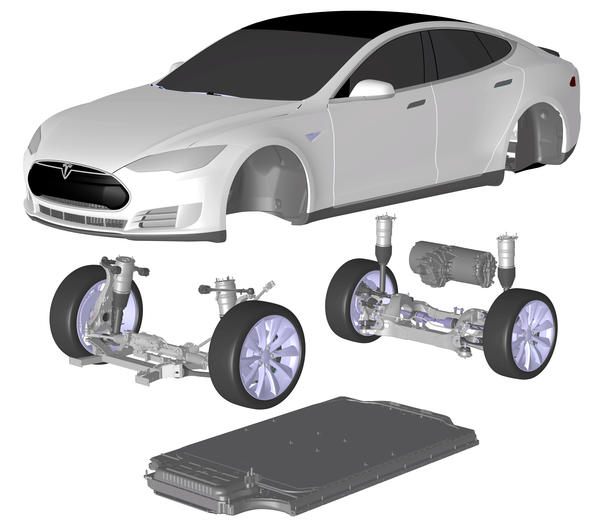Tesla Motors’ primary battery supplier is Panasonic, but they’ve been working with everyone else as well. Since collecting all this back in 2013, Tesla Motors announced plans to develop the Gigafactory. As of this moment it is September 2015 and the Gigafactory is under construction, due to go into production use sometime next year.
The information collected here serves as the justification for building the Gigafactory. That is, it shows 200,000+ Tesla Model 3’s manufactured per year would swamp the battery manufacturing industry.
PANASONIC AND TESLA REACH AGREEMENT TO EXPAND SUPPLY OF AUTOMOTIVE-GRADE BATTERY CELLS![]() – October 2013 –
– October 2013 –
Panasonic Corporation and Tesla Motors today announced that the two companies have reached an agreement in which Panasonic will expand its supply of automotive-grade lithium-ion battery cells to Tesla. With this agreement, the two companies update and expand their 2011 arrangement to now supply nearly 2 billion cells over the course of four years. The lithium-ion battery cells purchased from Panasonic will be used to power the award winning Model S as well as Model X, a performance utility vehicle that is scheduled to go into production by the end of 2014.
“This expanded agreement with Panasonic is important to Tesla as we continue to increase the pace of production,” said Tesla Co-Founder and CEO Elon Musk. “We look forward to strengthening our relationship with Panasonic, and I’m confident that this partnership will continue to be an integral part of Tesla’s success for years to come.”
Tesla in talks with Samsung SDI for battery supply deal![]() – Tesla and Samsung reportedly near battery supply agreement for Model X
– Tesla and Samsung reportedly near battery supply agreement for Model X![]() – October 2013 – Tesla and Samsung getting closer to an agreement.
– October 2013 – Tesla and Samsung getting closer to an agreement.
Tesla’s electric car plans set to swamp worldwide lithium battery manufacturing![]() – September 2013 – Tesla plans to be manufacturing 200,000+ electric cars a year in short order. Many are thinking this will stress the battery industry.
– September 2013 – Tesla plans to be manufacturing 200,000+ electric cars a year in short order. Many are thinking this will stress the battery industry.
The 85 kilowatt-hour Model S has a battery pack containing over 7,000 cells. It’s thought that Model S production is 70% of the 85 kilowatt-hour version, and 30% of the 60 kilowatt-hour version. Penciling out the math means Tesla will have produced over 1.6 gigawatt-hours of battery packs during 2013 for Model S production. Doubling Model S production by the end of 2014, as is the company’s plans, means producing over 3.2 gigawatt-hours of battery packs a year.
(CORRECTION: Earlier this had been written in units of megawatt-hours but had apparently slipped a few digits in the calculation, as pointed out by several readers. We could also note in passing that if Nissan produced 100,000 Leaf’s a year, worldwide, that’s 2.4 gigawatt-hours of battery packs a year.)
Putting this another way, in June Panasonic announced they’d delivered over 100 million lithium battery cells to Tesla. That’s not even enough for one year of production demand from Tesla Motors, at the current 21,000 Model S’s a year rate. In January, Panasonic discussed plans to open several new factories to “increase domestic production of lithium-ion battery used for automobiles to meet robust demand in the United States” (meaning Tesla Motors).
The battery pack design behind Tesla Motors’ stock price pop![]() – In September 2013, a stock price pop coincided with news of “Hybrid” battery pack design combining lithium-ion and lithium-air into one battery pack with more energy density. Electric Vehicle Extended Range Hybrid Battery Pack System (US 20130181511 A1)
– In September 2013, a stock price pop coincided with news of “Hybrid” battery pack design combining lithium-ion and lithium-air into one battery pack with more energy density. Electric Vehicle Extended Range Hybrid Battery Pack System (US 20130181511 A1)
Tesla talking with Samsung to supply battery cells![]() – August 2013 – Revelation that Tesla and Samsung are working on using Samsung’s 18650 cells in Tesla battery packs.
– August 2013 – Revelation that Tesla and Samsung are working on using Samsung’s 18650 cells in Tesla battery packs.
Tesla Model S sales rapidly growing, while accountants turn profit into loss![]() – August 2013 – during a quarterly analyst conference call, Elon Musk was asked about the Gen3 Affordable Mass Market Electric Car, and most of his response focused on battery suppliers and the size of the battery industry.
– August 2013 – during a quarterly analyst conference call, Elon Musk was asked about the Gen3 Affordable Mass Market Electric Car, and most of his response focused on battery suppliers and the size of the battery industry.





